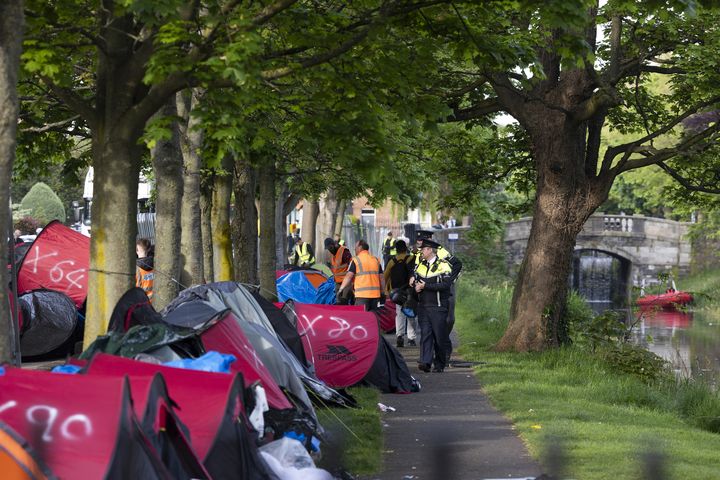
State-owned land is designated for housing asylum seekersThe number of tents along part of Dublin's Grand Canal rose from 57 yesterday to almost 90 today
The new camp began growing late last week between the Baggot Street and Leeson Street bridges on the city side of the canal.
The tents are next to each other and are now on either side of the towpath, with some on the slope between the path and the canal itself.
Asylum seekers are drawn to the area due to its proximity to the International Protection Office on Mount Street Lower.
This week there were about 40 tents there on Tuesday morning, the Irish Independent counted almost 60 yesterday morning and increased the number again during the night to between 75 and 90 tents on Thursday morning.
After removing the tents, barriers were placed around the canal area
The Taoiseach defended the Government's actions on the growing problem of migrant camps and said, in relation to the huge camp of around 200 tents that had developed on Mount Street, that he believed that “official Ireland is turning a blind eye to the development of what became almost a public health emergency.”
“What we saw on Mount Street was terrible. And we came very, very, very close to declaring a public health emergency,” he said.
“We have taken action on Mount Street, a multi-agency approach, and as a result of that and the multi-agency operation on the Grand Canal (last week) we saw around 450 people provided with better accommodation, sanitary facilities and amenities. safer shelter.
“But it is absolutely true that there is still a problem with the rise of tents. I think that's very different from Mount Street because in the case of Mount Street we don't see these being allowed to develop for weeks and weeks and months and months and months.
“What needs to happen here, however, are two things. We need to quickly identify a piece of state-owned land where we can safely provide tented accommodation with sanitary facilities. And that work is ongoing today. It happened yesterday. There is a lot of intensive involvement in that area.
“Second, we cannot start and end every conversation about migration with the offer of housing. That is just one aspect of what needs to be looked at in terms of a sustainable migration system.
“We also need to look at all the other factors related to immigration, such as how the social security system interacts, how we provide shelter, burdens passed on to people, and how we compare with other European countries.
“This week we put forward a note in government with about ten actions, one of which was accommodation, nine of which were in other areas, and all of which have to be implemented by a number of ministers because this requires a whole government. answer.”
He continued;
“I honestly don't think we are being served well. I don't think immigrants are well served. I don't think the people of Ireland are being well served when the only aspect of the conversation about immigration that we have been having for some time is about accommodation.
“It's extremely important. We have obligations in the field of housing and we fulfill them. But it is just part of a broader conversation that needs to happen about what a sustainable migration system looks like.”
Speaking about the growing number of tents, Labor leader Ivana Bacik has said that the “lack of coordination and lack of provision leads to the conclusion that the resulting tents amount to some kind of Rwanda policy for the Irish government”.
“They are allowing people to sleep in tents and it is almost as if they want to send out a signal to those who may come to Ireland to seek refuge,” she added.
